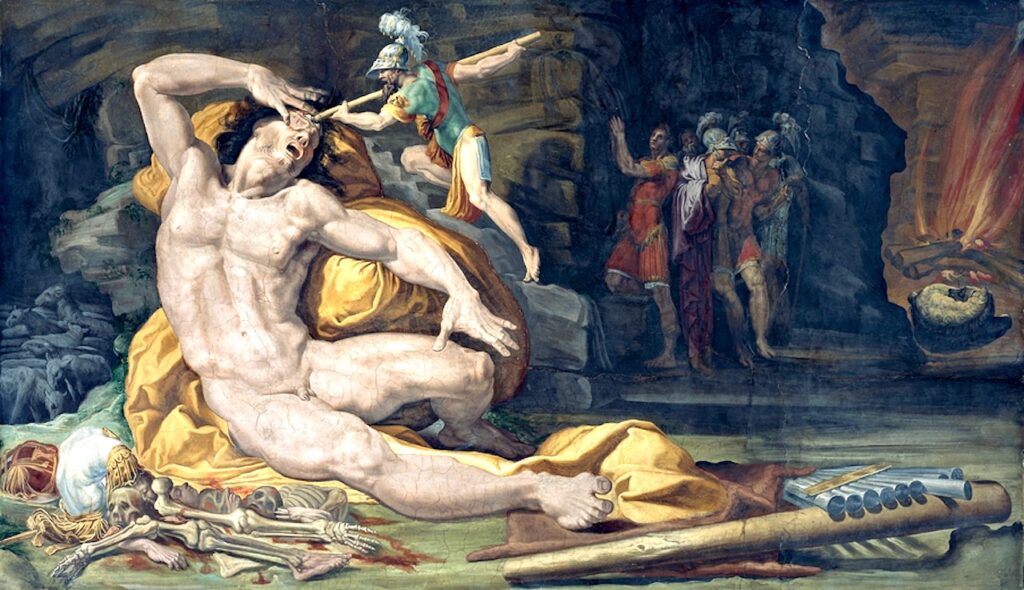Note: If you wish to receive, via e-mail, (1) my weekly newsletter or (2) daily copies of these posts, notify me at rrbates1951@gmail.com and indicate which you would like. I promise not to share your e-mail address with anyone. To unsubscribe, send me a follow-up email.
Monday
Since Veterans Day occurred over the weekend, I’m only now honoring the occasion, posting a poem that I really like about how literature came to the aid of one former soldier. In Amorak Huey’s “We Were All Odysseus in Those Days,” a man who survives a battle in which a friend dies looks to Homer to support him in his subsequent life.
The tale of Odysseus and Polyphemus is one that involves violence, tragedy, ingenuity, and trickery. Trapped by the Cyclops in his cave, Odysseus must watch as four of his men are devoured before his eyes.
I remember being haunted by the passage when I encountered it in high school. Here’s the scene in Robert Fitzgerald’s translation:
Neither reply nor pity came from him,
but in one stride he clutched at my companions
and caught two in his hands like squirming puppies
to beat their brains out, spattering the floor.
Then he dismembered them and made his meal,
gaping and crunching like a mountain lion—
everything: innards, flesh, and marrow bones.
I think of how a veteran who has watched a companion die in battle would relate to such a passage.
For Odysseus to escape with his remaining men requires “buying time and making do,” as Huey’s poem puts it. Odysseus’s first move involves what Huey calls a bad pun, made after he has plied Polyphemus with some potent wine:
“Cyclops,
you ask my honorable name? Remember
the gift you promised me, and I shall tell you.
My name is Nohbdy: mother, father, and friends,
everyone calls me Nohbdy.’
And he said:
“Nohbdy’s my meat, then, after I eat his friends.
Others come first. There’s a noble gift, now.”
Even as he spoke, he reeled and tumbled back…
Knowing that he and his men cannot move the stone blocking the cave, Odysseus chooses to blind rather than kill Polyphemus. The men then escape by clinging to the undersides of Polyphemus’s sheep as he takes them to pasture the following day. The cleverness of Odysseus’s bad pun becomes clear when Polyphemus attempts to rally the other Cyclopes to his aid: “Nohbdy has blinded me,” he tells them. Here’s the poem:
We Were All Odysseus in Those Days
By Amorak Huey
A young man learns to shoot
& dies in the mud
an ocean away from home,
a rifle in his fingers
& the sky dripping
from his heart. Next to him
a friend watches
his final breath slip
ragged into the ditch,
a thing the friend will carry
back to America—
wound, souvenir,
backstory. He’ll teach
literature to young people
for 40 years. He’ll coach
his daughters’ softball teams.
Root for Red Wings
& Lions & Tigers. Dance
well. Love generously.
He’ll be quick with a joke
& firm with handshakes.
He’ll rarely talk
about the war. If asked
he’ll tell you instead
his favorite story:
Odysseus escaping
from the Cyclops
with a bad pun & good wine
& a sharp stick.
It’s about buying time
& making do, he’ll say.
It’s about doing what it takes
to get home, & you see
he has been talking
about the war all along.
We all want the same thing
from this world:
Call me nobody. Let me live.
This English teacher and veteran will use Odysseus’s escape from death to stand in for his own experience. It’s a way to distance himself from the horrors he has witnessed, even as it simultaneously acknowledges those horrors. He, like Odysseus, has been on an epic quest and he, like Odysseus, has survived. Now he can live quietly–Call me nobody. Let me live–as he raises a family and gives back to his community.
While my own vet father didn’t directly witness fellow soldiers getting killed, he lost friends in World War II and also witnessed the horrors of the Dachau concentration camp three days after it was liberated. He too believed deeply in contributing to his community, getting me to wonder if there’s something about those who have been in war to commit themselves to a community of life. Not all veterans, to be sure, but many of them.
I think of the scene in Saving Private Ryan where the Tom Hanks character, after in fact saving Ryan at the cost of his own life, tells him before dying, “Earn this. Earn it.” And of Ryan, decades later, saying to his commander’s grave marker,
Every day I think about what you said to me that day on the bridge. I’ve tried to live my life the best that I could. I hope that was enough. I hope that at least in your eyes, I’ve earned what all of you have done for me.
When he turns to his wife and says to her, “Tell me I’ve led a good life. Tell me I’m a good man,” she replies—and one knows she speaks the truth—“You are.”
The veterans I have known were and are good men and women. To them I say belatedly, “Happy Veterans Day.”


